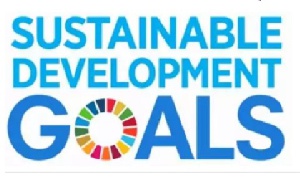 Each goal has specific targets to be achieved over 15 years - September 2015 to 2030.
Each goal has specific targets to be achieved over 15 years - September 2015 to 2030.
Ghana and other Africa countries would not be able to meet their commitment towards the successful implementation of the Sustainable Development Goals (SDGs) if they continue to wallow in the “blame game syndrome”.
Professor Kwabena Barima Antwi, an Associate Professor with the Department of Geography and Regional Planning at the University of Cape Coast has warned.
The blame games, he noted had been inimical to the socio-economic growth and development of Africa and could prevent Ghana from achieving the SDGs by 2030.
Prof Antwi said this during the opening of the fifth quadrennial and 52nd Central Regional delegates’ conference of the Ghana National Association of Teachers (GNAT) in Cape Coast.
The conference was on the theme: “Transforming Societies through Education: stakeholders preparedness towards Agenda 2030.”
He described apathy towards the national course as destructive and had the tendency to kill initiatives.
“Whenever there is something to do collectively as a nation, some people always distant themselves. Instead of supporting the leadership to make things work, we neglect our duties and accuse each other. This is a big problem in Africa,” Prof Antwi stated.
The United Nations adopted a set of 17 goals in September 2015, with the aim to end poverty, protect the planet and ensure prosperity for all as part of a new sustainable development agenda.
Each goal has specific targets to be achieved over 15 years- September 2015 to 2030.
Prof Antwi appealed to teachers, civil society, the private sector, Government and other stakeholders in the implementation of the SDGs to eschew the blame game and concentrate on issues aimed at achieving the goals.
He said the implementation and achievement of the 2030 agenda called for strong collaboration and more inclusive processes and commitment among stakeholders.
Prof Antwi noted that teachers remained crucial in the achievement of the SDGs, hence the need to equip and add value to them to enable them take the centre stage in the pursuit of Agenda 2030.
He said transforming societies within the framework of the SDGs could not be accelerated unless Governments prioritise the provision and delivery of quality education in the development agenda.
Madam Phillipa Larsen, the Acting National President of GNAT, called on teachers to show commitment for the work that they did and avoid negative practices such as absenteeism and laziness which hampered quality education delivery.
She admonished teachers to think outside the box and take advantage of available opportunities to develop and sharpen their technological and methodological skills to enable them take lead role in transforming the society.
Mr David Ofori Acheampong, National Secretary of GNAT, encouraged teachers to be abreast of the 17 SDGs as well as their required roles towards achieving them.
He said Government needed to provide adequate resources in terms of teaching and learning materials, infrastructure and teacher incentives if it was interested in raising the standards of education.
He assured teachers whose salaries were in areas to remain calm as the Association continued to engage the Government to get their monies paid.